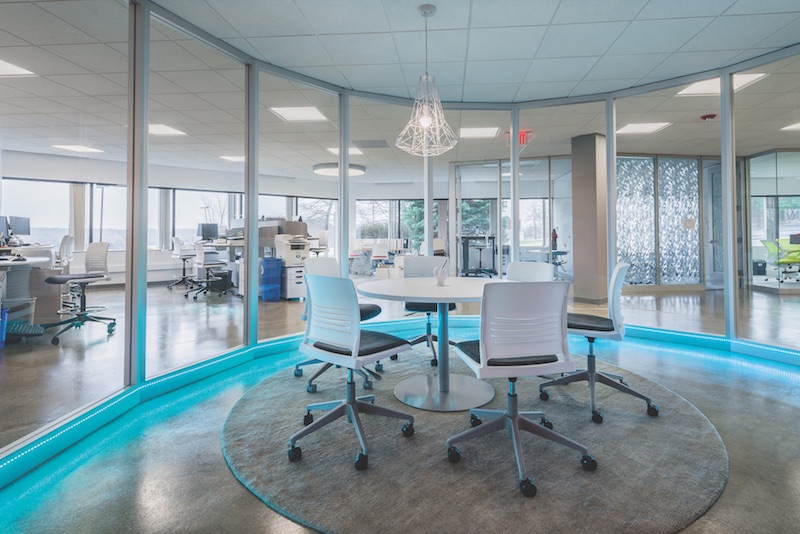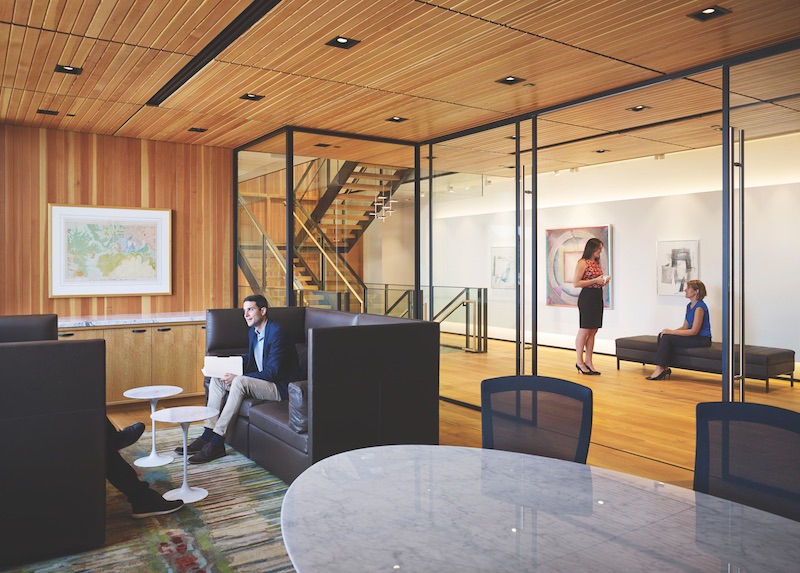
Companies have noticed a notable shift in recent years toward adopting glass office partitions. This trend is driven several factors, including the perceived benefits of improved productivity and collaboration, enhanced natural lighting and well-being, transparent communication and openness, and the desire for a modern and stylish work environment.
Moreover, the growing emphasis on sustainability and eco-friendly design has further propelled the popularity of glass offices.
This article explores the increasing preference for glass offices among companies, shedding light on this architectural choice’s potential advantages and considerations.
Table of Contents
Improved Productivity and Collaboration
Implementing glass offices has increased productivity and enhanced employee collaboration. Glass offices promote a sense of openness and transparency providing a flexible workspace that allows visual connections and easy communication. This, in turn, fosters a collaborative environment where employees can easily interact and share ideas.
Additionally, the abundant natural light in glass offices has been shown to impact employee satisfaction and well-being positively. Studies have found that exposure to natural light can improve mood, reduce stress, and increase overall satisfaction with the work environment.
With these benefits in mind, companies increasingly opt for glass offices to create a more productive and collaborative workplace.
Enhanced Natural Lighting and Well-being
Enhanced natural lighting in workspaces has been shown to impact employee well-being positively. Studies have indicated several health benefits associated with exposure to natural light, including improved sleep quality, reduced eye strain, and increased vitamin D levels.
Natural light also regulates circadian rhythms, leading to better mood and increased productivity. Additionally, employees working in spaces with ample natural light have reported higher job satisfaction and overall happiness.
The availability of natural light in the workplace has been linked to reduced stress levels, enhanced cognitive functioning, and increased creativity.
Transparent Communication and Openness
Transparent communication and openness in workspaces foster an environment where information flows freely, and stakeholders have access to pertinent information. Several factors, including the desire for increased accountability within organizations, drive this trend towards increased transparency.
When information is readily available to all employees, tracking and assessing individual and team performance becomes easier, there increasing accountability. Additionally, transparent communication can minimize the risk of misunderstandings, conflicts, and rumors, as everyone can access the same information.
However, there are also concerns regarding privacy in such open workspaces. Certain sensitive information may need to be shared in private, and employees may feel uncomfortable discussing personal matters in a glass office.
Modern and Stylish Work Environment
One of the defining features of a modern and stylish work environment is the incorporation of contemporary design elements that create an aesthetically pleasing and visually appealing space for employees.
This not only enhances the overall appearance of the workplace but also contributes to employee satisfaction and well-being.
Flexible workspaces, in particular, have become increasingly popular in recent years. These spaces allow employees to choose where and how they work, promoting collaboration, creativity, and productivity.
Additionally, the use of glass offices or partitions has gained traction, creating a sense of openness and transparency within the workplace. This design element fosters communication, collaboration, and a sense of unity among employees.
Sustainability and Eco-Friendly Design
Sustainability and eco-friendly design in the workplace have gained significant attention as organizations strive to reduce their environmental impact and promote responsible practices.
One key aspect of this trend is the emphasis on energy efficiency, which helps reduce carbon emissions and leads to cost savings for companies.
Organizations can minimize their energy consumption and lower their utility bills incorporating energy-efficient features in office design, such as efficient lighting systems, smart thermostats, and well-insulated windows.
Additionally, eco-friendly design principles prioritizing natural light and ventilation can contribute to a healthier and more productive work environment.
What Is Glass Best For The Office?

When considering glass for office spaces, several factors come into play to ensure a productive and aesthetically pleasing environment. Glass office partitions, such as glass partitions, sliding glass office walls, and glass office walls, offer numerous benefits.
Here’s how to choose the best glass options:
- Functionality and Privacy: Opt for frosted or etched glass partitions for office spaces where privacy is essential, such as glass conference rooms or glass office cubicles. These types of glass maintain an open feel while providing necessary privacy.
- Collaboration and Transparency: For collaborative environments, clear glass partitions are ideal. They encourage communication, visual connectivity, and a sense of transparency among team members, making glass office walls an excellent choice.
- Space Optimization: Sliding glass office walls are useful in creating adaptable spaces. These partitions allow you to open up or divide areas as needed, facilitating dynamic and flexible workspaces.
- Sound Control: Consider using laminated or double-glazed glass for glass office partitions. These types of glass provide enhanced sound insulation, making them suitable for spaces where noise reduction is important.
- Aesthetics: Choose glass partitions for the office that align with the overall design aesthetic. Whether you prefer sleek and modern or classic and professional, various frame options and finishes are available.
- Natural Light: Opt for glass partitions that allow ample natural light to flow through the office. This reduces the need for artificial lighting and creates a more inviting and energizing atmosphere.
- Durability and Maintenance: Select tempered or safety glass for added durability and safety. These types of glass are more resistant to breakage and are easier to maintain.
- Conference Rooms and Cubicles: When creating glass conference rooms or office cubicles, choose glass partitions that balance privacy and openness. Frosted or switchable glass can provide privacy during meetings while maintaining a sense of connection.
- Branding and Customization: Explore options for customization, such as incorporating company logos or designs onto the glass. This helps reinforce your brand identity within the office space.
- Professional Appearance: Consider using frameless or minimalistic frames for a sleek and professional appearance. These types of partitions contribute to a modern and organized office environment.
Are Glass Offices More Sustainable?
Glass offices can offer sustainability benefits in certain contexts, but their overall environmental impact depends on various factors. Here are some considerations to determine whether glass offices are more sustainable:
- Energy Efficiency: Glass allows natural light to penetrate, reducing the need for artificial lighting during daylight hours. This can lead to energy savings and a lower carbon footprint. However, excessive glass without proper shading or insulation can result in heat gain, requiring more cooling energy in warmer climates.
- Heating and Cooling: Well-insulated and energy-efficient glass can contribute to maintaining stable indoor temperatures. However, poorly insulated glass can lead to heat loss during colder months, increasing heating energy consumption.
- Materials: The production of glass involves raw materials and energy-intensive processes. The type of glass, the manufacturing process, and transportation factors influence the material’s sustainability. Recycled glass and low-emissivity (Low-E) coatings can improve the environmental profile of glass.
- Longevity and Maintenance: High-quality glass panels can be durable and long-lasting, reducing the need for frequent replacements. Proper maintenance is essential to extend the life of glass office components.
- Construction Impact: Installing glass office partitions or walls may involve construction and renovation activities, which can generate waste and emissions. Careful planning and sustainable construction practices can mitigate these impacts.
- End-of-Life Considerations: Glass is recyclable, which can reduce its environmental impact when it reaches the end of its useful life. Proper disposal and recycling procedures are essential to maximize this benefit.
- Daylight and Well-being: Natural light provided glass offices can positively impact occupant well-being, productivity, and satisfaction. However, excessive glare or insufficient shading can lead to discomfort and negate these benefits.
- Acoustic Comfort: Glass can transmit sound, potentially impacting the acoustic comfort of the office. Incorporating sound-absorbing materials or proper acoustic design can address this concern.
- Local Climate: The effectiveness of glass offices in terms of sustainability varies based on the local climate. Considerations about heat retention and insulation are critical in colder climates, while in warmer climates, managing solar heat gain is essential.
- Design and Retrofitting: Thoughtful design and retrofitting strategies, such as using high-performance glazing, thermal breaks, and shading devices, can enhance the sustainability of glass offices.
Conclusion
The rise in the popularity of glass offices among companies can be attributed to various factors.
By providing improved productivity and collaboration, enhanced natural lighting and well-being, transparent communication and openness, and a modern and stylish work environment, glass offices symbolize a shift towards a more efficient and innovative workspace.
Additionally, incorporating sustainability and eco-friendly design showcases a commitment to environmental responsibility.
As companies prioritize these aspects, glass offices have become a powerful symbol of progress and success in the corporate world.








